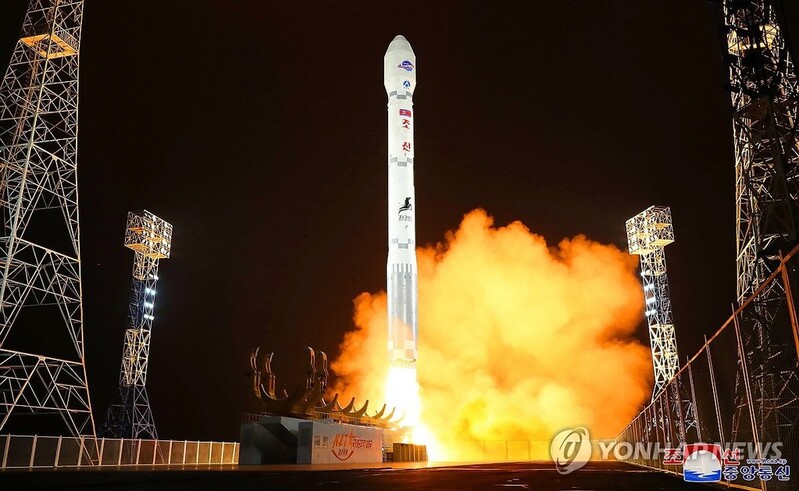 |
| ▲ A new type of Chollima-1 rocket carrying a reconnaissance satellite called the Malligyong-1 lifts off from the launching pad at the Sohae satellite launch site in Tongchang-ri in northwestern North Korea at 10:42 p.m. on Nov. 21, 2023, in this photo released the next day by the North's official Korean Central News Agency. North Korea said it has successfully placed the spy satellite into orbit and will launch several more satellites "in a short span of time" to secure its reconnaissance capabilities against South Korea. (For Use Only in the Republic of Korea. No Redistribution) (Yonhap) |
 |
| ▲ Defense Minister Shin Won-sik attends an extraordinary Cabinet meeting, presided over by Prime Minister Han Duck-soo, at the government complex in Seoul on Nov. 22, 2023, after North Korea said it has successfully placed a spy satellite into orbit. The Cabinet approved a motion to suspend part of a 2018 inter-Korean military agreement designed to reduce border tensions and prevent accidental clashes. (Yonhap) |
(News Focus) Koreas-military accord
(News Focus) Seoul pushes to restore surveillance capabilities after N.K. spy satellite launch
By Chae Yun-hwan
SEOUL, Nov. 22 (Yonhap) -- South Korea has partially suspended an inter-Korean military tension reduction agreement in the first response against North Korea, a day after Pyongyang launched a military spy satellite in defiance of international pressure.
On Wednesday, President Yoon Suk Yeol approved a motion to suspend a clause in the 2018 accord that calls for setting up a no-fly zone around the Military Demarcation Line separating the two Koreas.
South Korea has raised concerns about the agreement that officials say greatly hinders Seoul's readiness posture at a time when North Korea has repeatedly violated it over the years.
The suspension -- which is expected to take effect after Seoul notifies Pyongyang of the move later in the day -- will lift the no-fly zone to allow South Korea to resume aerial surveillance activities, such as unmanned drones, in the area.
Under the inter-Korean relations development act, South Korea can suspend agreements with North Korea if it is deemed necessary for national security. As the deal took effect without parliamentary ratification, its suspension does not require parliamentary approval.
South Korea said the suspension is a corresponding step to North Korea's efforts to bolster its own surveillance capabilities with the military spy satellite.
"North Korea is clearly demonstrating that it has no will to abide by the Sept. 19 Military Agreement designed to reduce military tension on the Korean Peninsula and to build trust," Prime Minister Han Duck-soo said in a Cabinet meeting on the accord's partial suspension.
"Our military's ability to identify threatening targets and its response posture will be greatly enhanced."
Hours after the satellite launch, Defense Minister Shin Won-sik instructed top generals to prepare measures for the deployment of intelligence, surveillance and reconnaissance assets in line with the planned partial suspension.
The move marked the first of its kind by Seoul, placing the fate of the agreement in uncertainty.
The Comprehensive Military Agreement was signed on Sept. 19, 2018, at the height of a reconciliatory mood when then President Moon Jae-in traveled to Pyongyang for summit talks with North Korean leader Kim Jong-un.
The deal includes setting up a land buffer zone, where artillery drills and regiment-level field maneuvers are to be suspended, as well as maritime buffer zones, where artillery firing and naval drills are to be banned.
It also designated no-fly zones near the border to prevent accidental aircraft clashes and outlined schemes to withdraw some border guard posts and disarm the Joint Security Area in the Demilitarized Zone.
But the deal's effectiveness has increasingly been called into question recently as inter-Korean relations remain frozen after the no-deal summit in Hanoi between Kim and then U.S. President Donald Trump in 2019.
North Korea has since focused on advancing its weapons programs, staging over 100 ballistic missile launches in the past two years.
Since the accord's signing, Pyongyang has committed 17 major violations through the end of last year, according to Seoul's Defense White Paper. Shin told lawmakers last month the North has made nearly 3,600 breaches in total, including the opening of its coastline gun ports.
In its announcement to partially suspend the deal, the National Security Council said the fate of the rest of the agreement would depend on North Korea's future actions, hinting at more suspensions should the North continue provocative acts.
Pyongyang, however, has shown no signs of halting its spy satellite program, announcing it will launch "several" more satellites in a short span of time.
The rivalry between the two Koreas is expected to further intensify as South Korea plans to launch its first military reconnaissance satellite on a SpaceX Falcon 9 rocket from the U.S. Vandenberg Space Force Base in California on Nov. 30.
(END)
(C) Yonhap News Agency. All Rights Reserved























![[가요소식] 조항조, 새 싱글](/news/data/20251116/yna1065624915927473_582_h2.jpg)










